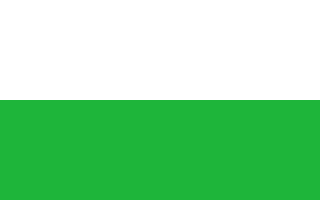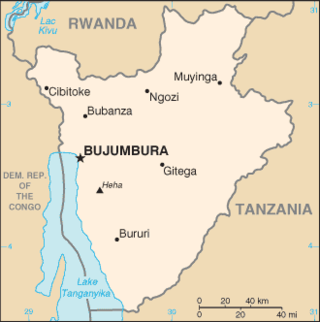
Burundi originated in the 16th century as a small kingdom in the African Great Lakes region. After European contact, it was united with the Kingdom of Rwanda, becoming the colony of Ruanda-Urundi - first colonised by Germany and then by Belgium. The colony gained independence in 1962, and split once again into Rwanda and Burundi. It is one of the few countries in Africa to be a direct territorial continuation of a pre-colonial era African state.

The president of Burundi, officially the President of the Republic, is the head of state and head of government of the Republic of Burundi. The president is also commander-in-chief of the National Defence Force. The office of the presidency was established when Michel Micombero declared Burundi a republic on 28 November 1966. The first constitution to specify the powers and duties of the president was the constitution of 1974 adopted in 1976. The constitution, written by Micombero, affirmed Micombero's position as the first president of Burundi. The powers of the president currently derive from the 2005 constitution implemented as a result of the 2000 Arusha Accords after the Burundian Civil War. The current president since 18 June 2020 is Évariste Ndayishimiye.

The Front for Democracy in Burundi is a Hutu progressive political party in Burundi.

The National Council for the Defense of Democracy – Forces for the Defense of Democracy is the major political party in Burundi. During the Burundian Civil War, the CNDD–FDD was the most significant rebel group active and became a major political party in Burundi. In March 2012, Pascal Nyabenda was elected as President of CNDD–FDD. Then on 20 August 2016, General Évariste Ndayishimiye was, in the extraordinary congress that took place in Gitega, elected as the Secretary General of the Party.

Burundi elects a head of state – the president – and a legislature on the national level. The National Assembly has 118 members, elected for a five-year term by proportional representation with a 2% barrier. The Senate (Sénat) has 49 members, elected for a five-year term by electoral colleges of communal councilors. Extra seats in both chambers can be added to ensure that ethnic and gender quotas are met. Burundi has a multi-party system, with two or three strong parties and a third party that is electorally successful. Parties are usually based on ethnic background.

Pierre Nkurunziza was a Burundian politician who served as the ninth president of Burundi for almost 15 years from August 2005 until his death in June 2020.

The Kingdom of Burundi or Kingdom of Urundi was a Bantu kingdom in the modern-day Republic of Burundi. The Ganwa monarchs ruled over both Hutus and Tutsis. Created in the 17th century, the kingdom was preserved under European colonial rule in the late 19th and early 20th century and was an independent state between 1962 and 1966.

The Council of Ministers of Burundi are the senior level of the executive branch of Burundi and consists of the Prime Minister of Burundi and various Ministers. The 2018 constitution, which enshrines ethnically-based power-sharing, requires that at most 60% of ministers come from the ethnic Hutu majority and at most 40% hail from the Tutsi minority. At least 30% of government ministers must be women. The members of the council are directly appointed by the President in consultation with the Vice-President and Prime minister.

Mass killings of Tutsis were conducted by the majority-Hutu populace in Burundi from 21 October to December 1993, under an eruption of ethnic animosity and riots following the assassination of Burundian President Melchior Ndadaye in an attempted coup d'état. The massacres took place in all provinces apart from Makamba and Bururi, and were primarily undertaken by Hutu peasants. At many points throughout, Tutsis took vengeance and initiated massacres in response.

Burundi, officially the Republic of Burundi, is a landlocked country in the Great Rift Valley at the junction between the African Great Lakes region and East Africa. It is bordered by Rwanda to the north, Tanzania to the east and southeast, and the Democratic Republic of the Congo to the west; Lake Tanganyika lies along its southwestern border. The capital cities are Gitega and Bujumbura, the latter being the country's largest city.

Presidential elections were held in Burundi on 28 June 2010. As a result of withdrawals and alleged fraud and intimidation, incumbent President Pierre Nkurunziza was the only candidate.

The 1987 Burundian coup d'état was a bloodless military coup that took place in Burundi on 3 September 1987. Tutsi president Jean-Baptiste Bagaza was deposed whilst traveling abroad and succeeded by Tutsi Major Pierre Buyoya.

Ezéchiel Nibigira is the current Minister of Foreign Affairs of the Republic of Burundi. He was previously Ambassador of Burundi in Kenya and leader of the youth wing of Burundi's ruling party CNDD-FDD. He was also a Member of Parliament representing Bujumbura rural where he chaired Burundi's parliament's Finance committee. Prior to his current post Nibigira was head of Burundi's customs as well as imports and exports. During President Pierre Nkurunziza's 2010 elections campaign, Nibigira was a chief campaign manager. Nibigira earned a Bachelor of Arts degree in Business from Hope Africa University.

Parliamentary elections were held in Burundi on 29 June 2015. The vote had been initially set for 5 June 2015, alongside local elections, but it was delayed due to unrest. Indirect elections to the Senate occurred on 24 July.

Presidential elections were held in Burundi on 21 July 2015. President Pierre Nkurunziza ran for a third term despite controversy over whether he was eligible to run again. The opposition boycotted the vote, and Nkurunziza won re-election.

On 25 April 2015, the ruling political party in Burundi, the National Council for the Defense of Democracy – Forces for the Defense of Democracy (CNDD-FDD), announced that the incumbent President of Burundi, Pierre Nkurunziza, would run for a third term in the 2015 presidential election. The announcement sparked protests by those opposed to Nkurunziza seeking a third term in office.

General elections were held in Burundi on 20 May 2020 to elect both the president and the National Assembly. Évariste Ndayishimiye of the ruling CNDD–FDD was elected president with 71% of the vote. In the National Assembly elections, the CNDD–FDD won 72 of the 100 elected seats.

General Évariste Ndayishimiye is a Burundian politician, who has served as President of Burundi since 18 June 2020. He became involved in the rebel National Council for the Defense of Democracy – Forces for the Defense of Democracy during the Burundian Civil War and rose up the ranks of its militia. At the end of the conflict, he entered the Burundian Army and held a number of political offices under the auspices of President Pierre Nkurunziza. Nkurunziza endorsed Ndayishimiye as his successor ahead of the 2020 elections which he won with a large majority.














